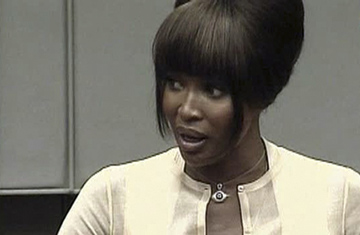
British supermodel Naomi Campbell testifies at the war-crimes trial of former Liberian dictator Charles Taylor at the U.N. Special Court for Sierra Leone in Leidschendam, the Netherlands, on Aug. 5, 2010
At the time, Naomi Campbell said, she didn't think much of the gift she received in the middle of the night. "I saw a few stones. They were very small, dirty-looking stones," the 40-year-old British supermodel insisted Thursday, Aug. 5, during her appearance before a war-crimes court in the Hague.
However, those stones were almost certainly blood diamonds, and prosecutors hope they can help tie former Liberian warlord and dictator Charles Taylor to a decade-long legacy of death in western Africa.
Campbell was testifying about an incident following a 1997 charity dinner in Cape Town, in which she received a sachet of diamonds from men who prosecutors believe were emissaries from Taylor. She appeared at the U.N.-backed Special Court for Sierra Leone, where Taylor, owing to his alleged involvement in the civil war in neighboring Sierra Leone from 1991 to 2002, is charged with 11 counts of war crimes and crimes against humanity — including murder, rape, mutilation of civilians and conscripting child soldiers.
In 1997, Campbell was a guest at a dinner hosted by South Africa's then President Nelson Mandela. Taylor also attended. Campbell told the court that she and Taylor barely exchanged words, yet after the dinner, two men knocked on her hotel door and handed her a pouch with uncut gems. Such presents, she claimed, are not unusual. "I get gifts given to me all the time. It is quite normal for me," she told the court. Nonetheless, the contents baffled her. "They were dirty-looking pebbles. I'm used to seeing diamonds [that are] shiny and in a box," she said.
But for the court, the key questions were whether the diamonds were linked to Taylor and whether Taylor used diamonds to fund Sierra Leone's civil war. The former President, 63, has dismissed the story as "totally incorrect" and has vehemently denied ever selling or trading diamonds to buy weapons for rebels in Sierra Leone.
Campbell herself suggested she was only tangentially connected to the defendant. "I didn't know anything about Charles Taylor," she said in response to prosecutors' questions about flirting with him during the dinner. "I had never heard of him before, never heard of Liberia before, never heard of the term blood diamonds before." She added that it was not initially clear who had given her the gifts. "There was no explanation and no note," she said.
Campbell's testimony appears at odds with the expected testimony of two other guests at the dinner — her former agent Carole White and actress Mia Farrow — who both are due to appear at the trial on Aug. 9. White has claimed publicly that she was present when the diamonds were delivered, while Farrow has said that Campbell told her they were a personal gift from Taylor.
Whether or not Campbell's testimony proves decisive in Taylor's complex trial, campaigners hope her presence will refocus international attention on war-torn west Africa. As many as 200,000 people were killed in the bloody conflict that embroiled Sierra Leone and Liberia and spread into the Ivory Coast and Guinea. Sierra Leone's Revolutionary United Front (RUF) rebels enslaved and mutilated thousands of civilians. Notorious for hacking off hands and arms of victims, they were even said to indulge in cannibalism. For his alleged role as a war criminal and supporter of the RUF, Taylor was indicted in 2003 and made his first appearance at the court in 2006, but his trial had fallen off the media radar since then. Perhaps for this reason, Taylor's lawyer, Courtenay Griffiths, accused prosecutors of using Campbell's fame as a "cheap publicity stunt" to grab headlines.
Alex Vines, a former U.N. diamonds-sanctions inspector for Liberia, says Campbell's testimony is unlikely to have a judicial impact on the case, but it will give it a boost politically. "She draws attention to the court and re-energizes the process," says Vines, who is now head of the Africa Program at the London-based Chatham House think tank. "The attention from the global media will keep pressure on the former warlords who are still at large. It will discourage them and help postconflict stability in the region."
Campbell's appearance also draws fresh attention to the problems still plaguing the diamond trade, despite global efforts to regulate it. For example, three years ago, one of the largest diamond finds in history was uncovered in Zimbabwe's Marange area, triggering a diamond rush by destitute citizens that was swiftly followed by a savage military crackdown that allegedly included the massacre of scores of diggers.
Nor are diamonds the only conflict resource: minerals like tantalum, tungsten, tin and gold — crucial for cell phones — are often smuggled out of war zones like the eastern Democratic Republic of the Congo. Apple head Steve Jobs said in a publicized e-mail to a customer in June that while all his suppliers must certify in writing that they use conflict-free materials, "honestly, there is no way for them to be sure." The Wall Street–reform bill that President Obama signed last month contains a provision requiring American firms to disclose whether their products contain minerals from the war-ravaged Congo or neighboring countries.
Back in the Hague, Campbell's mysterious testimony may not provide convincing evidence of Taylor's innocence or guilt, but in true supermodel fashion, it has at least turned the world's gaze — this time oto an important and neglected search for justice.
